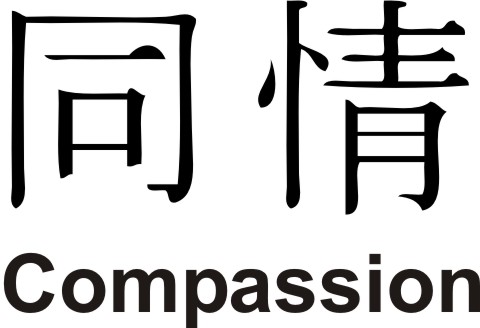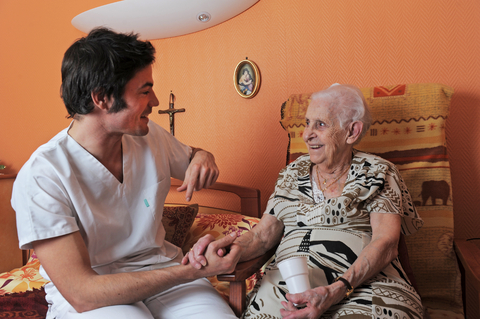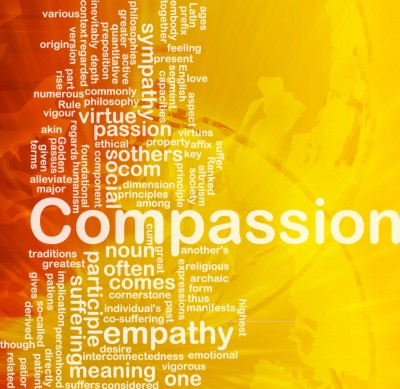Are you compassionate? Of course you are!! But…for yourself?
Meditation and its relationship to compassion has been a topic of conversation on this site recently. In a previous series, Meditation and Compassion, we discussed compassion and:
When you meditate, do you find that what usually occurs is that your mind runs riot with your attention and mental energy. Or have you come to realize the true magic of meditation where slowly and gradually you’ve gained perspective into how ridiculous your wild mind can be, how impermanent your thoughts are, and how compassionate you need to be with yourself when working with your mind?
I’ve used the following quote a lot in the discussion on meditation and compassion, probably because it hits the essence on why compassion for yourself is so necessary when learning to meditate. Even though the title of the book refers to a particular religious perspective, this quote is free of any religious undertones, it’s simply good advice!
In his book, Christian Meditation: Experiencing the Presence of God, author James Finley writes the following words on how and why we need to have compassion for ourselves when engaging in a meditation:
Our feelings of impatience and frustration with ourselves in meditation are certainly understandable, especially when they persist in spite of our best efforts to overcome them. But as we sit in meditation we can begin to recognize the subtle violence inherent in our impatience with ourselves. As our awareness and understanding of our limitations in meditation continue to deepen, we begin to gain greater insight into what is happening. We realize we are catching ourselves in the act of perpetuating violence towards our wandering mind, our wayward will, or our sleepiness—in short, toward those very aspects of our self that need to be loved the most. We realize that to stop meditating simply because we feel we are not good at it amounts to abandoning the very aspects of our self that need patience and loving encouragement. We see that the whole venture in meditation is going to be a rough ride unless we can learn not to invade and abandon ourselves in response to all the ways in which meditation exposes our limitations and shortcomings. It is precisely at this point that we begin to appreciate the liberating power of compassion.[i]
How Do You Practice Compassion?
Do you do this in meditation? Do you practice, “…perpetuating violence towards [y]our wandering mind”? It’s amazing but when we do this, we’re engaging in yet another distraction that is preventing us from realizing the deeper and truer nature of our own mind.
In asking what is meditation and what is compassion, we can say that meditation is the practice or the art of non-distraction and that compassion (in meditation) is the art of being compassionate for ourselves when we find ourselves distracted.
Meditation Practice Fosters Compassion
I hear so many people say that they can’t practice meditation because they have “too many thoughts,” or “get distracted too easily.” With these comments often come the self-critical components of “I’m no good at it,” or, “It doesn’t work for me,” as if it magically works for others. In this tendency to beat ourselves up over our failures in meditation, we can see the vital need for compassion, especially as Finley describes it.
What’s amazing is that as you progress in your exploration of the mind and its habits through the practice of meditation, you begin to realize that not just you, but everyone has this same kind of desire to be free from the kind of self-criticism that you encounter when you’re learning to meditate. And even those who don’t meditate, maybe especially so, end up caught in the vicious cycle of self-defeating thoughts that lead to an agitated mind.
Finley’s quote beautifully describes the compassionate quality that we need to have for ourselves in order to learn how to practice meditation. Here’s the bonus! As we develop that compassion for ourselves, we naturally come to find it for others as well.
As we practice meditation more and more, and encounter the way that we, “…invade and abandon ourselves in response to all the ways in which meditation exposes our limitations and shortcomings…” we begin to have a sense of compassion for ourselves. As this compassion deepens, we begin to see the suffering in others that we find in ourselves, suffering based on a mind that is used to self-judgement.
Another You
The compassion that comes for others is based on the realization that the person in front of you is no other than “another you,” another human who wishes to have happiness and to avoid suffering. To help you with this kind of practice, seeing others from a compassionate and meditative awareness, I’ve prepared the following PDF for you, Compassion and Kindness Practice. Please feel free to upload it and use it as a tool in your meditation practice.
So, as you begin to establish a meditation practice, or even if you already have a well-established practice, continually remind yourself – even humorously – that you deserve compassion for yourself, and that by persisting in your practice, you will not only gain benefit by having more compassion towards “the meditator,” but that with this care for yourself, you’ll come to gain a deeper insight into the need for compassion for those who you work with, live with, and encounter in your life.
What is meditation? Finding compassion at the heart of your practice. What is compassion? The mind that recognizes others as similar to ourselves in their desire to be happy and their longing to be free from suffering.
For another view of compassion and how to express it in your daily life, I found a beautiful video on YouTube titled, “40 Acts of Compassion.” Enjoy!
How To Meditate
Maybe you’ve already got a meditation practice. If that’s the case, great! Keep it up. And feel free to use all of the content from this site to support you in your efforts. If you haven’t started to meditate, begin now.
Many people don’t meditate because they believe that they need to do “something special” in order to meditate, maybe you’re one of them. “Doing something” special isn’t the case. All you need is your breath, and a few minutes of time set aside to begin your practice. Here are some tools to get you started:
- Meditation audio for using your breath as the anchor of your attention during meditation.
- Ebook and two chapters from the book, Minding the Bedside: Nursing from the Heart of the Awakened Mind, on how to meditate.
- Even though my book was written with nurses in mind, I continue to get feedback from those who have bought it who aren’t nurses that they find it useful in their lives. So, check out the book, Minding the Bedside: Nursing from the Heart of the Awakened Mind. It’s really written for anyone. You can even buy it in a Kindle version!
This site has tons of tools for learning how to meditate.
I encourage you to look through the HUNDREDS of articles that I’ve written and especially check out my weekly meditation tips and other useful meditation materials provided for your health and well being. And please let me know if you’d like to discuss anything with me, have any questions or need clarification regarding anything that I’ve written about.
Thanks for visiting and have a mindful day.
_______________________________________________________________________________________
[i] Finley, James. Christian Meditation: Experiencing the Presence of God. San Francisco: Harper, 2004, pg. 279.






I would like to point out that the chinese words “同情” are Less accurately represent “Compassion”. They represents more towards “Sympathy” and “Empathy”. Compassion is more accurately represent by “慈悲” , which encompasses More deeper meaning of “compassion” than “同情”. They words seem to have the same meaning in English translation but they have subtle and slightly different meaning in Chinese language. So, using these worlds do convery different meaning to Chinese speaker.
Thank you.
Hi. Thank you for clarifying the accurate meaning of the Chinese words that I used. I apologize for using symbols that I did not have a deeper understanding of. Definitely my mistake. Also thank you for providing me with the correct characters. That’s my fault for using an image that I found beautiful without knowing its true meaning. Thanks again and have a great day. Take care, Jerome
[…] isn’t bounded by those we feel affection for or to those who serve our personal needs. Real compassion is about recognizing that everyone, even your boss, wants to have happiness and its …. So, if meditation helps you to be more compassionate, and real compassion is felt for everyone […]